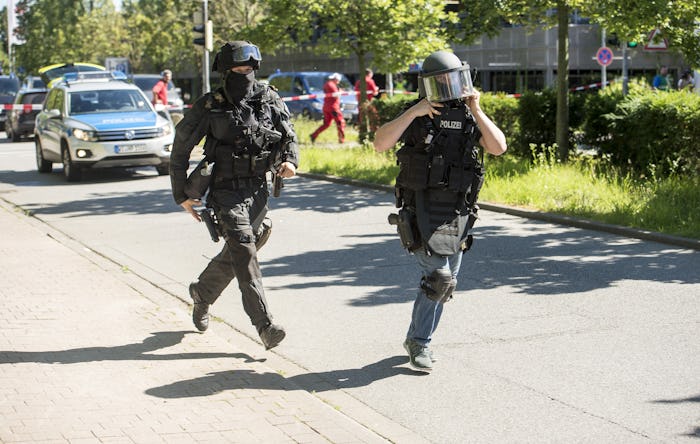
Why You Shouldn't Just #PrayForGermany
As the news broke Thursday that an armed man walked into the Kinopolis movie theatre in Viernheim, Germany and opened fire, Twitter immediately filled with expressions of grief and solidarity with the victims of the incident. But as the aftermath of the deadly shooting in Orlando on June 12 has shown, sharing sentiments on social media does very little to change an international climate in which firearms, particularly those designed to kill many people very fast, are all too available. It is not enough to #PrayforGermany, and there are unfortunately too many examples of why that is the case.
Fortunately, the Associated Press and Reuters are reporting no serious injuries other than to the shooter himself, who The Wall Street Journal reports was shot and killed by authorities. But the initial response on social media shows that people have learned that hashtags and tributes online are an adequate response. On Thursday Twitter users expressed sentiments similar to ones they had when the Orlando news broke almost two weeks ago:
Yet in the days since, the United States Senate failed to pass any of the four gun control bills proposed in response to finally impose greater limits on who can buy a gun in the U.S. and how easily they can go about it. The House of Representatives has similarly taken no action, leading House Democrats to stage a sit-in on the House floor in an attempt to get the Republican leadership to hold a vote on one of the gun control measures that had been proposed. The House of Representatives adjourned for the July 4th weekend midday Thursday with no vote held or planned.
Similarly, the U.S. failed to pass gun control legislation after the attacks on Sandy Hook Elementary school in Newtown, Connecticut in 2012 that killed 20 elementary school children and six of their teachers; a San Bernardino, California rehab center in 2015, where 14 people died, not including the two perpetrators; an Aurora, Colorado movie theatre in 2012 in which 12 people died; a rampage at Virginia Tech University in 2007 that killed 32; and many more. In all of those shootings, the assailant used a legally obtained semi-automatic weapon. No meaningful U.S. gun control legislation was passed in response to any of those incidents.
In Europe, authorities have been more open to curtailing gun access in the wake of violence. Germany already has fairly stringent gun laws, but guns can easily be procured from other countries in the Union. The European Union agreed to stricter gun regulations earlier this month, according to The Globe and Mail, in response to the ISIS attacks on Paris and Brussels in the last year, in which the perpetrators were European nationals who had procured assault weapons legally. The agreed upon measures include more stringent rules on the sale and ownership of semi-automatic weapons, banning semi-automatic weapons that are easily turned into automatic weapons, and stricter controls on purchasing guns on the internet, along with rules for limiting the reactivation of guns that had been taken out of circulation and better tracking of trafficked weapons. Individual EU lawmakers still need to adopt the new rules.
Because legislation like this has been such a long time coming — and may take even longer in the U.S. — it's not suprising that other Twitter users pointed out Thursday that simple "pray for" sentiments have not once produced the result people around the world desperately need: legislation that prevents ordinary citizens from accessing assault weapons.
The only thing that will change the status quo is action: making it extremely difficult for any individual to buy a gun intended to destroy large numbers of other people in a short period of time. Stable governments have the ability to do that. When they don't, they are choosing to let incidents like what happened in Orlando and what could have happened in Germany Thursday happen again and again.